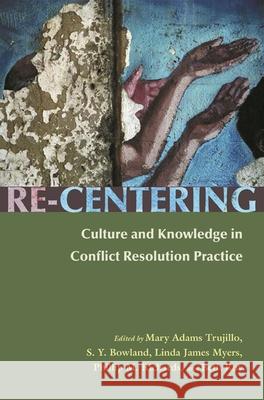Re-Centering: Culture and Knowledge in Conflict Resolution Practice » książka
Re-Centering: Culture and Knowledge in Conflict Resolution Practice
ISBN-13: 9780815631620 / Angielski / Miękka / 2008 / 404 str.
Re-Centering: Culture and Knowledge in Conflict Resolution Practice
ISBN-13: 9780815631620 / Angielski / Miękka / 2008 / 404 str.
(netto: 74,59 VAT: 5%)
Najniższa cena z 30 dni: 77,35
ok. 30 dni roboczych.
Darmowa dostawa!
At its core, the field of conflict resolution is about relationships and ways of approaching methods for problem solving. These relationships and approaches vary greatly depending on the individual, society, and historical background. Cultural perspective is thus fundamental to any dispute intervention. Re-Centering Culture and Knowledge in Conflict Resolution Practice is a collection of essays by scholars and practitioners of conflict resolution and grassroots members of communities whose contributions are not commonly recognized. The volume offers a sampling of the cultural voices essential to effective practice yet often considered marginal in the discourse of conflict resolution. The authors explore the role of culture, race, and oppression in resolving disputes. Drawing on firsthand experience and sound research, the authors address such issues as culturally sensitive mediation practices, the diversity of perspectives in conflict resolution literature, and power dynamics. The first anthology of its kind, this book combines personal narratives with formal scholarship. By melding these varied approaches, the authors seek to inspire activism for social justice in today's multicultural society.
At its core, the field of conflict resolution is about relationships and ways of approaching methods for problem solving. These relationships and approaches vary greatly depending on the individual, society, and historical background. Cultural perspective is thus fundamental to any dispute intervention. Re-Centering Culture and Knowledge in Conflict Resolution Practice is a collection of essays by scholars and practitioners of conflict resolution and grassroots members of communities whose contributions are not commonly recognized. The volume offers a sampling of the cultural voices essential to effective practice yet often considered marginal in the discourse of conflict resolution. The authors explore the role of culture, race, and oppression in resolving disputes. Drawing on firsthand experience and sound research, the authors address such issues as culturally sensitive mediation practices, the diversity of perspectives in conflict resolution literature, and power dynamics. The first anthology of its kind, this book combines personal narratives with formal scholarship. By melding these varied approaches, the authors seek to inspire activism for social justice in todays multicultural society. <











